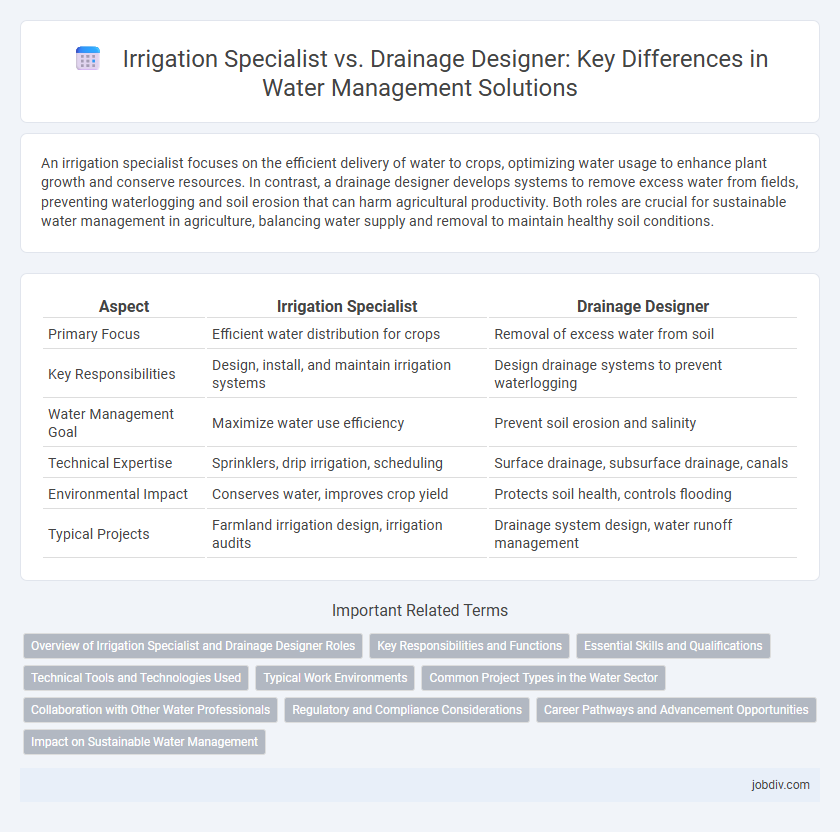An irrigation specialist focuses on the efficient delivery of water to crops, optimizing water usage to enhance plant growth and conserve resources. In contrast, a drainage designer develops systems to remove excess water from fields, preventing waterlogging and soil erosion that can harm agricultural productivity. Both roles are crucial for sustainable water management in agriculture, balancing water supply and removal to maintain healthy soil conditions.
Table of Comparison
| Aspect | Irrigation Specialist | Drainage Designer |
|---|---|---|
| Primary Focus | Efficient water distribution for crops | Removal of excess water from soil |
| Key Responsibilities | Design, install, and maintain irrigation systems | Design drainage systems to prevent waterlogging |
| Water Management Goal | Maximize water use efficiency | Prevent soil erosion and salinity |
| Technical Expertise | Sprinklers, drip irrigation, scheduling | Surface drainage, subsurface drainage, canals |
| Environmental Impact | Conserves water, improves crop yield | Protects soil health, controls flooding |
| Typical Projects | Farmland irrigation design, irrigation audits | Drainage system design, water runoff management |
Overview of Irrigation Specialist and Drainage Designer Roles
Irrigation specialists focus on designing, implementing, and managing water distribution systems to optimize agricultural productivity and conserve water resources. Drainage designers engineer systems to remove excess water from soil, preventing waterlogging and protecting infrastructure and crops from damage. Both roles require expertise in hydrology, soil science, and environmental impact assessment to enhance water management efficiency.
Key Responsibilities and Functions
Irrigation specialists focus on designing and managing efficient water delivery systems for agricultural and landscaping purposes, ensuring optimal water usage and crop yield through precise scheduling and system maintenance. Drainage designers develop systems to effectively remove excess water from soil or urban areas, preventing waterlogging and erosion while protecting infrastructure and promoting soil health. Both roles require expertise in hydrology, soil science, and engineering principles, but irrigation specialists emphasize water application, whereas drainage designers prioritize water removal and control.
Essential Skills and Qualifications
Irrigation Specialists require expertise in soil science, hydrology, and efficient water management techniques to design systems that optimize water use for agriculture and landscaping. Drainage Designers must possess strong knowledge in civil engineering, hydrological modeling, and environmental regulations to develop systems that prevent waterlogging and manage surface runoff effectively. Both roles benefit from proficiency in CAD software, project management, and an understanding of local climate and soil conditions.
Technical Tools and Technologies Used
Irrigation specialists utilize soil moisture sensors, automated irrigation scheduling software, and remote sensing technologies to optimize water delivery efficiency. Drainage designers employ hydrological modeling tools, geographic information systems (GIS), and sub-surface drainage simulation software to design effective water runoff and prevent soil saturation. Both disciplines increasingly integrate IoT devices and data analytics platforms to enhance precision and sustainability in water management systems.
Typical Work Environments
Irrigation specialists typically work outdoors on farms, golf courses, or landscaping projects, designing and installing water distribution systems to optimize crop yield and landscape health. Drainage designers primarily operate in engineering firms or municipal planning offices, focusing on creating systems that manage surface and subsurface water to prevent flooding and soil erosion. Both professions collaborate closely with environmental engineers and agronomists to ensure sustainable water management in diverse agricultural and urban settings.
Common Project Types in the Water Sector
Irrigation specialists primarily focus on designing and implementing efficient water delivery systems for agricultural fields, golf courses, and landscaping projects, ensuring optimal water use for crop growth and soil health. Drainage designers, on the other hand, concentrate on creating effective wastewater and stormwater management systems, including urban drainage networks, flood control channels, and agricultural drainage infrastructure to prevent waterlogging and erosion. Both professionals play crucial roles in water resource management, often collaborating on integrated projects involving irrigation efficiency and drainage optimization in sustainable water sector development.
Collaboration with Other Water Professionals
Irrigation specialists collaborate closely with agronomists and hydrologists to design efficient water delivery systems that maximize crop yield and conserve water resources. Drainage designers work alongside civil engineers and environmental consultants to develop effective water runoff and soil moisture management solutions, preventing waterlogging and erosion. Their joint efforts ensure a balanced water management strategy that promotes sustainable agricultural practices and environmental protection.
Regulatory and Compliance Considerations
Irrigation specialists ensure water application systems comply with regulations such as the Clean Water Act and local water use permits, emphasizing efficient water management and preventing contamination. Drainage designers focus on adhering to stormwater management regulations and floodplain ordinances, ensuring proper runoff control and minimizing soil erosion. Both roles require comprehensive knowledge of environmental compliance standards to maintain sustainable water practices and avoid legal penalties.
Career Pathways and Advancement Opportunities
Irrigation Specialists focus on optimizing water delivery systems for agriculture, employing technologies such as drip and sprinkler irrigation to enhance crop yield and conserve water. Drainage Designers specialize in creating effective water removal systems to prevent soil erosion and waterlogging, using expertise in hydrology and civil engineering principles. Career advancement for Irrigation Specialists often leads to roles in sustainable water management or agricultural consultancy, while Drainage Designers can progress toward senior engineering positions or environmental project management.
Impact on Sustainable Water Management
Irrigation specialists optimize water delivery systems to enhance crop yield while minimizing water waste, directly supporting sustainable agricultural practices. Drainage designers focus on effective water runoff management, preventing soil erosion and reducing waterlogging, which protects water quality and maintains soil health. Both roles are essential in integrated water management strategies aimed at conserving water resources and promoting sustainable land use.
Irrigation Specialist vs Drainage Designer Infographic

 jobdiv.com
jobdiv.com